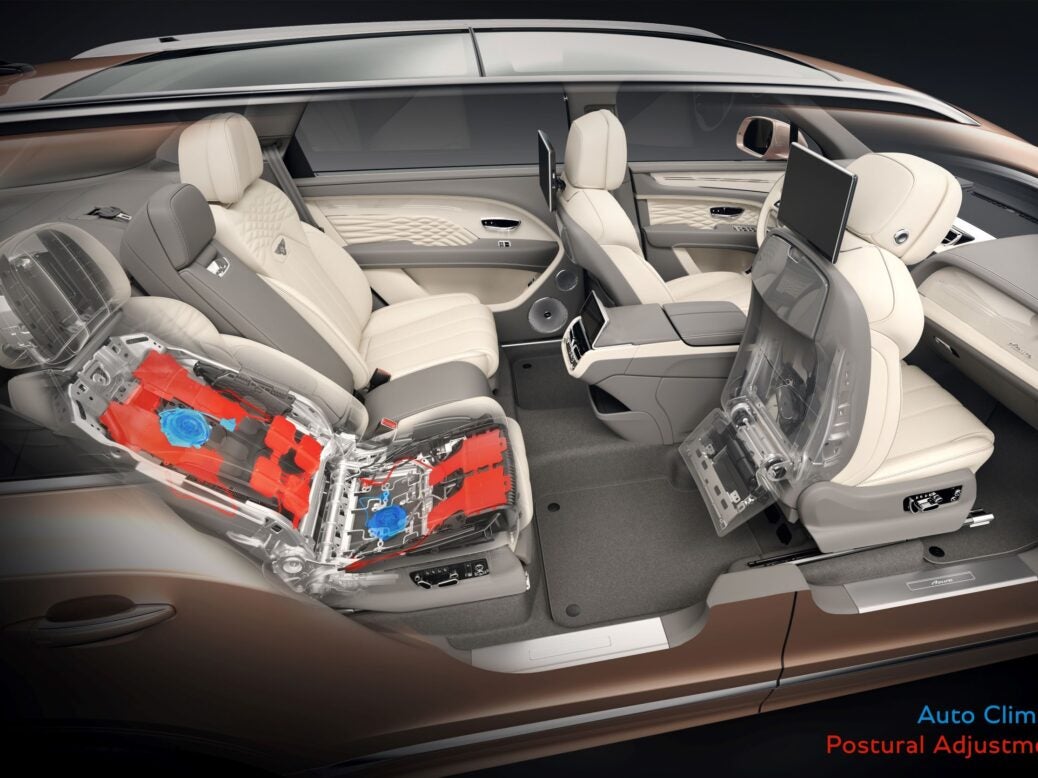
Volkswagen owned Bentley claims the new airline seat specification optional in the Bentayga EWB SUV is “the most advanced seat ever fitted to a car”. It has 22 adjustment modes, a claimed world first automatic climate sensing system and advanced postural adjustment technology.
Bentley said initial customer uptake for the new seat is 50 per cent.
Auto climate
After a rear seat passenger selects a desired temperature from seven different levels, sensors in the auto climate seat senses passenger temperature and surface humidity with an accuracy of 0.1°C every 25 milliseconds. The system can then determine whether to apply heat, ventilation or both simultaneously to keep the passenger at optimum comfort (or, in Bentley speak, “thermal wellbeing”). At the initial phase, the seat works efficiently to deliver the desired temperature, bringing the seat heating and ventilation systems into use as quickly as possible.
The system then maintains the optimal thermal comfort throughout the journey with micro adjustments to the seat thermal system to maintain the setpoint.
“In trials we observe a human can only notice a change in surface temperature between 1-2°C, but the system is constantly monitoring actual temperature to a much more detailed level, so the system knows what the passenger is going to need before they would know themselves,” Bentley claimed. Live data allows the system to activate before the passenger even knows it is required, providing an intelligent and autonomous experience where manual control is no longer needed to maintain comfort.
This auto climate system has seven set points (neutral plus six others) and the ability to balance the focus on just the back or cushion area. The seven set points are not linearly spaced, and have been derived from extensive passenger testing in combination with leading research in this field. Based on the clinical data, trials observed:
75 per cent to 80 per cent of people will use position ‘0’, a neutral set point permanently, without any adjustment. This delivers the optimal comfort targets established through trials testing different passengers and different environments.
15 per cent to 20 per cent will use the +1 or -1 set points (personal preference) and do not need to adjust the system subsequently to aim for a slightly warmer or cooler target temperature.
Around 5 per cent are likely to +2 / -2 for medium periods on specific days, to increase or decrease the target temperature a little more. For example, +2 would be used for back pain where a specific warming relief is desired. -2 is, for example, when a passenger is feeling ill and wants an unnaturally cooler condition.
+3 and -3 are provided to further move the target temperature from the usual average target. In testing this was only used in cases of extreme climate conditions or illness where the bias of the system is required to form a larger delta form the optimal target temperature.
The auto climate system uses existing seat heating technology but a new seat ventilation fan was developed to move approximately 80 per cent more air than the previous system. Less power is consumed than the current seat climate system and in auto climate mode the overall power consumption of the complete system is circa 40 per cent less than being manually activated by the passenger.
Postural adjustments
While many fatigue recovery system exist (seat massage, for example), the postural adjustment system is the next step further providing a proactive anti-fatigue system. By subtly adjusting the contact pressure between body and seat through soft pneumatic activation zones, the system goes beyond the 2D motions typical of adjustable seats, and employs a three-dimensional twist to relieve pressure points. These motions are controlled by complex algorithms that have been developed in collaboration with a chiropractor who deals with clients who experience discomfort on long car journeys.
Working with specialists Comfort Motion Global (CMG), Bentley developed a scientific, pneumatic postural adjustment system. CMG has been working in the field of fatigue prevention for several years, conducting medical-based research trials that highlight the benefits of changes in posture for comfort and wellbeing.
By creating subtle changes in the seat surface contact zones, body tissues that have been under pressure are relieved, and other areas, pressure is then applied. This allows the body a chance to locally recover naturally. The postural motion creates small changes in back and limb angles and can increase blood flow. Particularly in the lower back and lower limbs reducing discomfort, therefore passengers remain more alert and focused for a much longer period.
The airline seats have optimised seat contact profiles as well as a complex seat interlayer construction, tuned to work in perfect harmony with the chassis of the car. Working together the ride comfort is smooth and passengers are isolated from road vibration.
The adjustable profiles can morph to suit different customer shape and build. The adjustable leg and footrest feature allows customers to achieve a seated posture that is individually comfortable to them for longer periods.
Studies have shown that actively supporting body weight in a dynamic way relieves strain, which can prime mental stress and create lack of focus. Natural supported postures have been shown to alleviate stress from tensed muscles.
The airline seat option also adds further cushion and backrest bolster adjustment, cushion extension, electric headrest height adjustment and a deployable footrest to the back of the front passenger seat. The rear seat passenger on this side of the car can also move the front passenger seat forwards via a VIP mode.
Adjustment
An array of 12 silent electric motors deliver 22 ways of adjustment in the seat alone, along the user to shape the seat to suit their body shape and also to work or rest. The motors are joined by three intelligent pneumatic valve electronic control units, and the combination of motors and valves is overseen by a master seat motion & wellbeing ECU.
